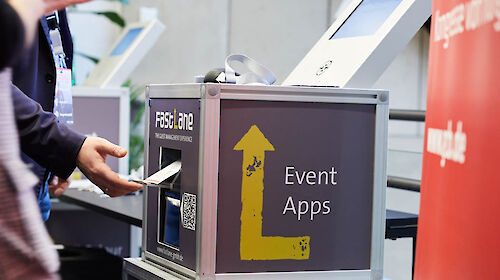"Planning a virtual event is not a technical challenge, but a conceptual one"
GCB FutureTalks #7 with Christina Buttler
 © Dr. Christina Buttler
© Dr. Christina Buttler
Matthias Schultze talked to Christina Buttler, Director Strategy & Innovation at MCI Germany, to discuss congresses and conferences of the future. She is convinced: Virtual and hybrid event formats will change established event formats even after the end of the current corona crisis.
Matthias Schultze: How does the current situation – the worldwide spread of the corona virus – affect MCI Germany?
Christina Buttler: It is a challenging time, no question. Our business is experiencing change, some of which is going to last forever. The virus – and this is certainly the only positive aspect to come from this situation – is forcing our industry as well as our customers, companies and associations to accelerate our digitization efforts, though.
Last year I presented countless lectures and workshops dealing with congresses and conferences of the future, but more often than not I was looking into doubtful faces whenever I was addressing the importance of the digital pre- and post-life of events as well as hybrid event parts. Now we can easily suggest and set up virtual conferences, though. But we must realize that one-dimensional content at on-site events is losing its relevance at this very moment.
Matthias Schultze: #KeepYourDistance – What impact has the crisis had on your daily work routines?
Christina Buttler: Thankfully we have had an enormous advantage at MCI, which enabled us to transition into our home offices very smoothly. Even before the crisis started, we were already using virtual tools such as MS Teams and Skype, we were making phone calls over the internet and have established a purely digital financial system. We are trained in working remotely and being organized into self-managing teams has surely played its part as well.
Nonetheless, we have deliberately introduced more video calls for our teams and units. These calls are being used to coordinate our work activities, but we also use these calls to have fun together, laugh or give tours of our home offices. We have also established virtual team events, such as yoga, after-work beer events, music sessions and the like. Of course, there are times when our mood is affected by this situation, but all in all I almost feel like we have gotten closer as a team.
Matthias Schultze: What is your take on the rise and the future role of virtual events?
Christina Buttler: Obviously, digital events and conferences have taken the leading role in today’s market. However, this does not change anything about our established consulting approach of discussing and developing projects in detail with our clients. This can be done, for example, by using digital Co-Creation Workshops, to determine the event’s overall objective. Digital events can be one means to achieve our clients’ objectives, but it does not necessarily have to be the only one.
Of course, most of our clients’ recent inquiries have started with a request to digitize their events, which had previously been planned as face-to-face events. Such changes usually entail some modifications to the event’s structure and its program though. Naturally, lectures can be digitized more easily than interactive formats. However, we must realize that a full day of lectures will not keep audiences interested. On that note, I firmly believe that the rise of virtual events will get rid of the unpopular 1-hour lecture monologue.
The key message is this: Planning a virtual event is not a technical challenge, but rather a conceptual one.
Matthias Schultze: Which event formats do you expect to see in the future and how are they going to change?
Christina Buttler: I believe that we will be seeing a greater hybrid share at future face-to-face events. Audiences will take them for granted. We will also start to accept virtual participants as equal participants. They will no longer be regarded as a threat to on-site participant numbers.
And: events that limit their program to one-dimensional knowledge transfer, adorned with some discussion, will not find their way back from the virtual sphere. There is no need for participants to spend money and time on traveling to these events. Therefore, people are going to realize that digital events are the perfect solution for these particular formats.
Interactive and participative formats, however, will return quickly once we have overcome the pandemic. Whilst there are charming digital solutions for them as well, they will not move past the status of a second-best solution. Our forecast: Events and conferences that add value to their communities will experience a boom!
 ©
© ©
© ©
© ©
©